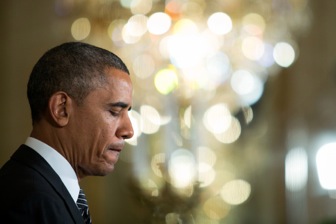US president urged to reign on S. Sudan during Africa visit
July 23, 2015 (NEW YORK) – A US-based international human rights organisation, Enough Project, has called on the US president Barrack Obama, to use his this week’s visit to Africa to urge the two influential East African leaders, president Uhuru Kenyatta of Kenya and prime minister Hailemariam Desalegn of Ethiopia, to impose sanctions on South Sudan in the drive to end the war.

Experts and policy analysts in the Enough Project have written a statement to president Obama, urging him to agree on plan of action with the two East African leaders to end the violence in South Sudan.
In the statement entitled, ‘Creating a Cost for Those Destroying South Sudan,” a copy of which was extended to Sudan Tribune, the experts called for action by the two powerful leaders in the region so as to save the new nation from collapse, which they said, was born with support from the US government and people.
“South Sudan is now under the grip of two competing groups of kleptocrats who have shown a repugnant disregard for human suffering in their quest to enrich themselves, but it does not need to stay that way. Decisive sanctions enforcement by the international community, asset recovery efforts, and a hybrid court with purview over economic crimes can break these illicit networks and make way for peace,” said Akshaya Kumar, policy analyst at the Enough Project.
They argued that to support the IGAD-Plus mediation efforts, much more work was needed to alter the calculations of the warring parties from pursuing armed violence to pursuing peace. The leaders of the two sides, they said, had been fighting on in the belief that there will be no personal consequence.
The organization also accused what it said were outside actors who collaborated in the destruction of “this embryonic state” through their military support and collusion in vast corruption, both past and present.
“Without a wider strategy of financial pressures and a push to secure regional and broader international cooperation for that approach, it will be difficult to address the deep political divisions fuelled by a violent struggle for the spoils of a corrupt state,” said John Prendergast, founding director of the Enough Project.
He said president Obama’s trip to the two nations in Africa offered an opportunity to reorient US government policies to move beyond threats and focus on a much more “robust strategy of disrupting and ultimately dismantling the network that is funding, fuelling, and profiting from the conflict in South Sudan.”
“One of the most important steps President Obama can take while he is here in the region is to secure a commitment from President Kenyatta and Prime Minister Hailemariam that they are willing to enforce high-level targeted sanctions against those most responsible for attacks against civilians,” added another senior analyst, Justine Fleischner, Sudan and South Sudan policy analyst.
President Obama, he said, should also secure their commitment to cooperate with any subsequent investigations to return the proceeds of corruption back to the people of South Sudan.
ACTION REQUIRED
The experts and policy analysts said there was need for president Obama to work with the Kenyan and Ethiopian leaders in support of multilateral arms embargo and the imposition of an escalating set of high-level sanctions designations against “politically influential individuals and their enablers.”
The statement to the US president also urged him to encourage the Kenyan and Ethiopian leaders to enforce the existing sanctions designations by freezing the assets and restricting the travel of the six military commanders who were already designated by the UN Security Council.
“Make it clear that if the presence of any of the designated individuals is required for the peace process, the government of Ethiopia can request a case-by-case exemption from the U.N. Sanctions Committee as provided under U.N. Security Council Resolution 2206,” the statement reads.
“This push in the region should be coupled with a directive to the Departments of State and Treasury as well as to other relevant agencies to intensify their efforts to collect information and develop dossiers on potential additional targets for sanctions,” it said.
These targets, the experts further stressed, may include South Sudan’s high-level political leaders and their financial backers, in the region and beyond.
They said the strategy could lay the foundation for a rapidly escalating targeted sanctions regime that begins to finally create a cost for those making the decisions to continue the war or fund and profit from it.
It urged Kenya and Ethiopia to contribute actively to a transnational effort to trace, seize, freeze, and return the proceeds of corruption to the people of South Sudan by sharing intelligence through the Asset Recovery Inter-Agency Network of Eastern Africa.
At the same time, further reads the statement, prioritize US inter-agency support to the Department of Justice’s Kleptocracy Asset Recovery Initiative as it seeks to identify actionable cases of grand corruption with a strong connection to the United States.
It also called on collaborative work with the United Kingdom’s Proceeds of International Corruption Unit and with Europol, Canada, and Australia to pursue this agenda internationally.
(ST)
